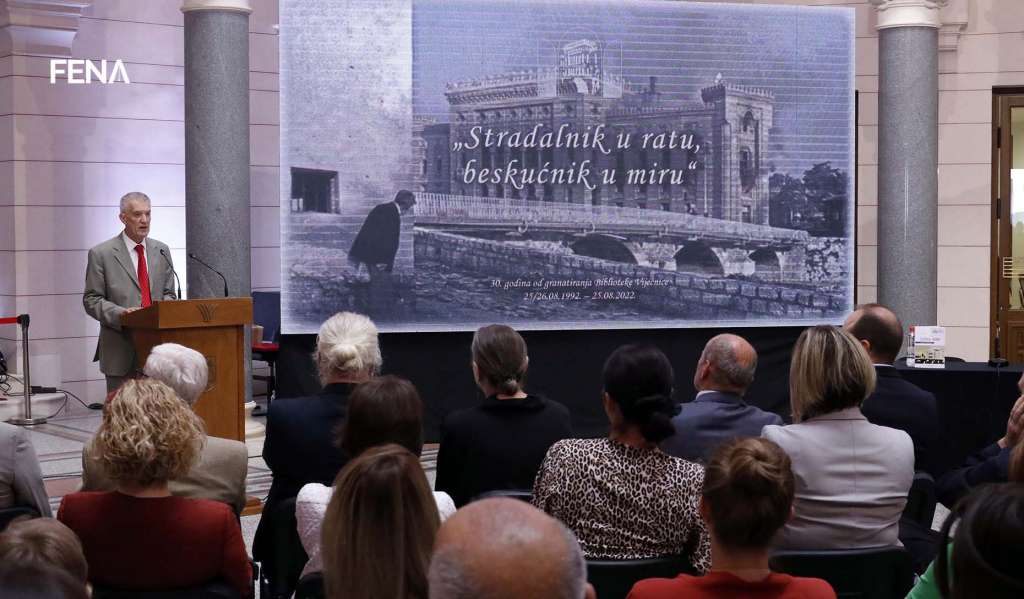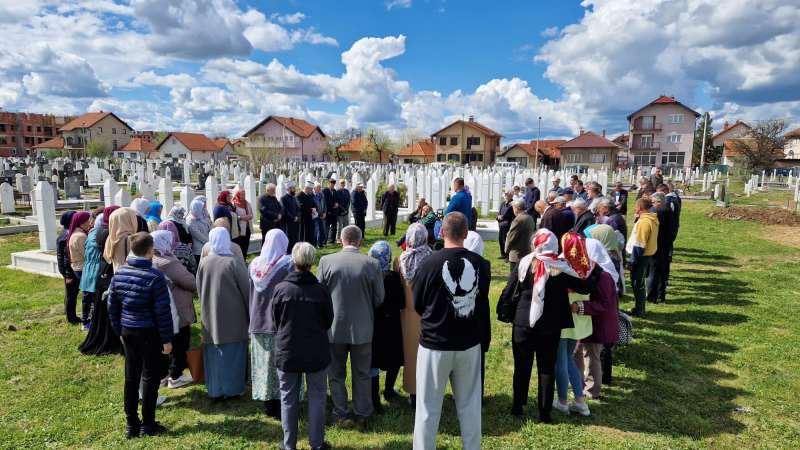SARAJEVO, August 25 (FENA) - The symbol of the city and one of the most representative buildings from the Austro-Hungarian period - the Sarajevo City Hall, which housed the National and University Library of Bosnia and Herzegovina (NUBBH), during the siege of the BiH capital (1992-1995) was shelled continuously, and on the night of August 25-26, 1992, shells fired from the aggressor positions on the hills around Sarajevo caused a big fire in which this building and priceless cultural treasure were almost completely destroyed.
Today, a ceremony was held at the City Hall to commemorate the sad 30th anniversary of the burning of this building and the National and University Library of BiH, the institutions that bear witness to the continuity of the Bosnian-Herzegovinian being and cultural identity, to the suffering, but also to the restoration of the values on which that identity is based.
Referring to the mentioned event, the director of the National Library of Bosnia and Herzegovina, Ismet Ovčina, reminded that a large part of the cultural heritage of Bosnia and Herzegovina was burned in the fire, and that around two million library items were irretrievably lost.
At the same time, he expressed contentment with the fact that 19,700 library units from special collections were saved, which comprise an important part of the cultural heritage, bearing witness to what BiH has been through the ages - common life, multiculturalism, multiconfessional aspect and multiethnicity, i.e. the centuries-old tradition of the life of peoples and citizens of this country.
"Heterogeneous and pluralistic character of Bosnia and Herzegovina, its spiritual traditions, represent the essence of the identity of our country and mostly speak of the habitus and reality of our community. The existence of institutions like this library and its funds to a large extent testifies and affirms the values on which BiH is based and what it has been for centuries," said Ovčina.
Looking at the current moment, the director of the NUBBH sent an appeal for an urgent resolution of the legal status and financing of this institution and its "return" to the building of the City Hall.
Its former director (in the period 1993-2005) Enes Kujundžić pleaded for the resolution of the status of the NUB of Bosnia and Herzegovina, recalling the selfless commitment to the revival and development of this institution in the war and post-war period and the importance of those efforts.
He assessed that libraries are institutions through which the humanistic tradition of a country and a society is defined, underlining that these are institutions with a long memory.
"The most tragic thing would be if the very institutions that preserve memory are exposed to oblivion, and that can happen if the NUB does not return to the City Hall," warned Kujundžić.
The participants of the ceremony were greeted by the deputy High Representative in BiH and the head of the Political and Fiscal Department Tobias Privitelli, recalling the suffering of the Sarajevo City Hall, a building that carries great symbolism, and expressing satisfaction with its successful restoration.
"The OHR views the City Hall as one of the fundamental symbols of the history of BiH. It is a symbol of resilience, togetherness and tolerance," said Privitelli, pointing out that it is not only a building of stunning beauty but also a meeting place of cultures, which gives hope for new generations and a better future.
The commemoration of the sad anniversary was accompanied by numerous and varied content, including the projection of video material about the burning of the National Library of Bosnia and Herzegovina, testimonies of eyewitnesses, former employee Duško Toholj, who saved the books, and one of the firefighters, Omer Šetić.
Among other things, the presentation of the NUBBiH publication "City Hall - In Search of Identity" was promoted, as well as the awarding of certificates of appreciation and the opening of appropriate exhibitions, as well as the contemporary and artistic music concert 'No Borders Orchestra', which will be held on August 26.
The Sarajevo City Hall was opened on April 20, 1896, and since then it has witnessed all the events in the capital of BiH. It was originally the building of the then city administration.
After the Second World War, until 1949, it served as the city administration building, as the building of the District Court of Sarajevo and the seat of the Assembly of Bosnia and Herzegovina, after which it became the City Library, that is, the National and University Library of Bosnia and Herzegovina.
During the siege of Sarajevo, the City Hall was shelled on several occasions, and after the end of the war, its reconstruction began. The building was renovated and officially opened on May 9, 2014. During the renovation, an old part that "survived" the fire of 30 years ago was built into each room of the City Hall.
All parts of the City Hall were made according to documents and photographs of the appearance of the original City Hall stored at the Kaptol Archives in Zagreb, and it now houses books and manuscripts of exceptional value, most of them rarities.
(FENA) S. R.











